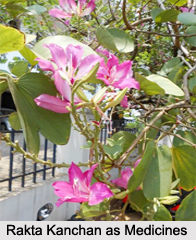 Bauhinia Variegata or Rakta Kanchan is a commonly used medicinal plant by the tribals throughout India and popular in various indigenous system of medicine like Ayurveda, Unani and Homeopathy.
Bauhinia Variegata or Rakta Kanchan is a commonly used medicinal plant by the tribals throughout India and popular in various indigenous system of medicine like Ayurveda, Unani and Homeopathy.
Health Benefits of Rakta Kanchan
The plant pacifies vitiated Kapha, diarrhoea, skin diseases, rectal prolapse, diabetes, inflammations, worms, tumors, haemorrhoids and menorrhagia. The bark of Bauhinia Variegata is described as alterative, tonic, astringent and useful in scrofula, skin diseases and ulcers.
Dose of Rakta Kanchan in Medicine
Chakradatta recommends the bark of the red variety to be rubbed into an emulsion with rice water and administered, with the addition of ginger, in scrofulous enlargement of the glands of the neck.
Sarangadhara gives the following preparation for the same affection. Kanchanara Guggulu: Take the bark of Bauhinia Variegata 80 tolas, the 3 myrobalans 60 tolas, ginger, black pepper, long pepper and the bark of Crataeua religiosa (varuna) 8 tolas each, cardamom, cinnamon and tejpatra each 2 tolas, powder them all and rub together with Guggulu, equal in weight to all the other ingredients. Dose should be half a tola to be taken every morning with a decoction of Sphoeranthus mollis (mundi) or of catechu. This medicine is said to be useful in scrofulous enlargements of glands, tumours, ulcers, skin diseases, etc.
This article is a stub. You can enrich by adding more information to it. Send your Write Up to content@indianetzone.com
Related Articles
Ayurveda
Ayurveda Medication
Elements of Ayurveda
Concepts of Ayurveda
Ancient Literature of Ayurveda




















